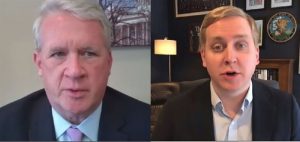State republicans call for balanced budget
By Peter Hancock Capitol News Illinois — February 16, 2021
House Minority Leader Jim Durkin, left, and Deputy Minority Leader Tom Demmer discuss the state’s budget situation ahead of Gov. J.B. Pritzker’s budget address during a virtual news conference Monday, Feb. 15. (Zoom.us)
SPRINGFIELD – Republican leaders in the Illinois House are calling on Gov. J.B. Pritzker to propose a truly balanced budget when he delivers his budget address Wednesday, Feb. 17 noting he should avoid relying on money that may never materialize.
That’s what happened in May when lawmakers adopted the current fiscal year’s budget. That plan called for $42.9 billion in in General Revenue Fund spending, but it was predicated on the assumption that Congress would pass an aid package for state and local governments and that Illinois voters would approve Pritzker’s proposed constitutional amendment to allow for a graduated income tax.
The graduated tax amendment failed in the November election and Congress so far has not passed a stimulus package that includes aid to state and local governments, although the new Biden administration has proposed one.
“The Illinois Constitution cannot be more clear about the responsibilities of the executive branch,” House Minority Leader Jim Durkin, of Western Springs, said during a virtual news conference Monday, Feb. 15. “Article 8, Section 2 and 2(b) say that the governor presents a budget that must balance spending with estimated revenue available for that fiscal year. Estimated revenue, not wishful thinking.”
In response to the drop in revenue caused by the COVID-19 pandemic and the failure of the proposed graduated income tax, Pritzker announced in mid-December that he was ordering more than $700 million in spending reductions along with plans to borrow $2 billion through the Federal Reserve’s Municipal Liquidity Facility. Those were two steps aimed at tackling a budget deficit that could still exceed $1 billion for the current fiscal year.
According to the latest monthly report by the Governor’s Office of Management and Budget, base revenues flowing into the state have actually been running about 6.2 percent above estimates as individual income tax and sales tax receipts have come in better than expected.
State spending, however, also has exceeded budgeted amounts, primarily due to heavier than expected Medicaid expenses, which are partially paid for with federal funds.
So far, Pritzker has revealed little about the budget he plans to propose for the next fiscal year, which begins July 1. In a brief email last week, his office said that the $700 million in spending cuts would be carried forward into the next year and that he will propose closing about $900 million in what he calls “corporate tax loopholes.” It also said he would not propose an increase in individual income or sales taxes.
He also said that for the second straight year, he will not propose a general increase in K-12 education funding, which makes up the largest share of general state spending, although he does expect a large increase in federal aid for public schools. State law calls for adding $350 million to the K-12 funding formula each year.
But that still leaves a deficit of roughly $3 billion for the upcoming fiscal year and the governor’s office has not said how Pritzker plans to fill that gap.
Deputy Minority Leader Tom Demmer, R-Dixon, noted during the news conference that due to the pandemic, the budget lawmakers passed in May gave the governor unprecedented authority to shift money between agencies and line items and to direct the spending of billions of dollars in federal disaster relief aid, and he said he believes this year lawmakers should reassert their own authority.
“Last year, the state was on the receiving end of billions of dollars from the federal government and again, it was it was programs that were overseen by the administration through emergency rules and through an unprecedented level of appropriation authority that was unchecked and unreviewed by the General Assembly,” Demmer said. “We must reengage our role as a coequal branch of government to provide the kinds of checks and balances that the people of Illinois expect.”
Pritzker is scheduled to deliver his annual budget message to the General Assembly via a live video feed at noon Wednesday, Feb. 17.
phancock@capitolnewsillinois.com



